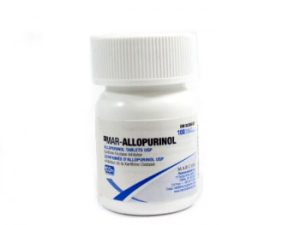Generic Allopurinol: Side Effects, Usual Dose, Special Populations
- Type of Drug: Antigout medication
- Prescribed for: Gout or gouty arthritis. Allopurinol is also useful for cancer and conditions that may be associated with too much uric acid in the body. Some studies have indicated that Allopurinol mixed into a mouthwash has been helpful for people taking Fluorouracil, an antineoplastic drug, in the prevention of ulcers of the mouth, stomach, and intestines.
 Generic Allopurinol General Information
Generic Allopurinol General Information
Unlike other antigout drugs, which affect the elimination of uric acid from the body, Allopurinol acts on the system that manufactures uric acid in your body. A high blood level of uric acid can mean that you have gout or that you have one of many other diseases, including various cancers and malignancies, or psoriasis. High uric acid levels can also be caused by taking some drugs, including diuretic medicines. However, a high blood level of uric acid does not point to a specific disease.
Cautions and Warnings
Do not take this medication if you have ever developed a severe reaction to it. If you develop a rash or any other adverse effects while taking Allopurinol, stop taking the medication immediately and contact your doctor. Allopurinol should be used by children only if they have high uric acid levels due to neoplastic disease or very rare metabolic conditions where Allopurinol may be needed to correct the problem. A few cases of liver toxicity have been associated with Allopurinol; they improved when the drug was stopped. Periodic liver and kidney tests should be performed while taking this medicine. People with severely compromised kidney function should take a reduced dose of this medicine.
Generic Allopurinol Possible Side Effects
- Most common: rash, which has been associated with severe, allergic, or sensitivity reactions to Allopurinol. If you develop an unusual rash or other sign of drug toxicity, stop taking this medication and contact your doctor.
- Less common: nausea, Vomiting, diarrhea, intermittent stomach pains, effects on blood components, and drowsiness or lack of ability to concentrate.
- Rare: effects on the eyes, loss of hair, fever, chills, difficulty breathing or asthma-like symptoms, arthritislike symptoms, itching, loosening of the fingernails, pain in the lower back, unexplained nosebleeds, cataracts, conjunctivitis and other eye conditions, numbness, tingling or pain in the hands or feet, confusion, dizziness, fainting, depression, memory loss, ringing or buzzing in the ears, weakness, sleeplessness, and feelings of ill health.
Drug Interactions
Large doses of drugs that make your urine more acid, like megadoses of vitamin C, may increase the possibility of kidney stone formation. Alcohol, Diazoxide, Mecamylamine, or Pyrazinamide can increase the amount of uric acid in your blood, requiring a possible increase in your Allopurinol dose. Allopurinol may increase the action of Azathioprine, Mercaptopurine, or Cyclophosphamide and other anticancer medicines, leading to possible bleeding or infection. Taking Allopurinol together with Dacarbazine, Probenecid, or Sulfinpyrazone may cause additive reductions in uric acid. Allopurinol may interact with anticoagulant (bloodthinning) medications, reducing the rate at which the anticoagulant is broken down in the body. Dosage reduction is necessary. Allopurinol can reduce the breakdown of Chlorpropamide (for diabetes), causing an increase in antidiabetic effect. Dosage adjustment may be necessary. People who are susceptible to Ampicillrn, Amoxicillin, Bacampicillin, or Hetacillin rash are more likely to have that problem while also taking Allopurinol. Taking a thiazide diuretic with Allopurinol increases the chances of a drug-sensitivity reaction. Using Vidarabine and Allopurinol together can increase the risk of neurotoxic effects and anemia, nausea, pain, and itching. Large doses of Allopurinol (more than 600 mg per day) may increase the effects of and chances for toxic reactions to Theophylline by interfering with its clearance from the body.
Generic Allopurinol Food Interactions
Take each dose with food or a full glass of water and drink 10 to 12 8-ounce glasses of water, juices, soda, or other liquids each day to avoid the formation of crystals in your urine and/or kidneys.
Usual Dose
- Adult and Adolescent (age 11 and older): 100 to 800 mg per day, depending on disease and response.
- Child (age 6 to 10): 300 to 600 mg per day.
- Child (under age 6): 150 mg per day.
The dose should be reviewed periodically by your doctor to be sure that it is producing the desired therapeutic effect.
Generic Allopurinol Overdosage
The expected symptoms of overdose are exaggerated side effects. Allopurinol overdose victims should be taken to a hospital. ALWAYS bring the medicine bottle.
Generic Allopurinol Special Information
Allopurinol can make you drowsy or make it difficult for you to concentrate: Take care while driving a car or operating hazardous equipment. Call your doctor at once if you develop rash, hives, itching, chills, fever, nausea, muscle aches, unusual tiredness, fever, yellowing of the eyes or skin, painful urination, blood in the urine, irritation of the eyes, or swelling of the lips and/or mouth. Avoid large doses of vitamin C, which can cause the formation of kidney stones while you are taking this medicine. You should drink a lot of water (10 to 12 8-ounce glasses a day) while taking Allopurinol. If you forget to take your regular dose of Allopurinol, take the missed dose as soon as possible. If it is time for your next regular dose, double this dose. For example, if your regular dose is 100 mg and you miss a dose, take 200 mg at the next usual dose time.
Special Populations
Pregnancy/Breast-feeding This drug may cause birth defects or interfere with your baby’s development. Check with your doctor before taking it if you are, or might be, pregnant. A nursing mother should not take this medication, since it will pass through the mother’s milk to the child. Seniors No special precautions are required. Be sure to follow your doctor’s directions and report any side effects at once.
